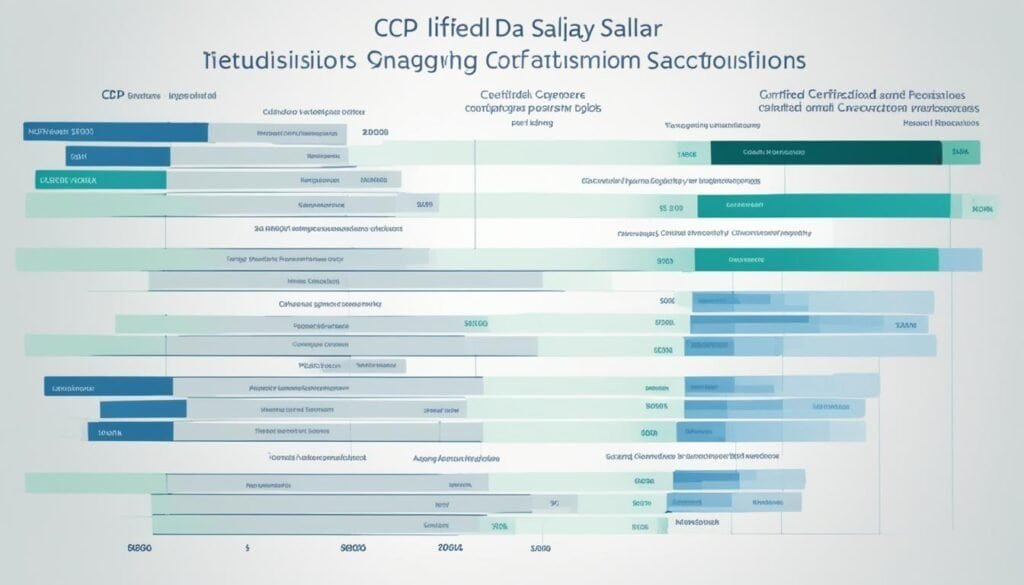Certified Data Professional (CDP)
Did you know that professionals with a Certified Data Professional (CDP) certification earn an average salary of $165,000 per year? The field of data management is rapidly growing, and organizations are actively seeking skilled data professionals to handle the increasing volume and complexity of data. Whether you are interested in data analytics, big data, data science, data governance, data engineering, or data warehousing, obtaining a CDP certification can give you the competitive edge you need to excel in this dynamic industry.
Understanding the Certified Data Professional (CDP) Certification
The CDP certification is designed to validate the skills and knowledge of data professionals in various domains, including data management, analytics, and business intelligence. Administered by organizations like DAMA International, this certification demonstrates a commitment to excellence in the field.
It covers different domains such as data governance, data modeling, data quality, and data analytics, among others. The certification also has multiple levels, including Associate, Practitioner, and Expert, which represent different stages of expertise and experience.
By obtaining a CDP certification, data professionals can showcase their proficiency in data management and analytics, making them highly sought-after in the industry.
“CDP certification opens up a world of opportunities in the field of data science and management. It not only validates your skills but also provides a competitive edge in the job market.”
With a CDP certification, professionals gain a deep understanding of data governance practices, enabling them to ensure data compliance and security, manage data lifecycles, and make informed business decisions based on data insights.
To illustrate the variety of domains covered by the CDP certification, here’s a breakdown of the key areas:
| Certification Domain | Description |
|---|---|
| Data Governance | Focuses on establishing policies and processes for data management and ensuring the availability, integrity, and security of data. |
| Data Modeling | Deals with designing and creating data models that represent real-world entities and their relationships, enabling efficient data storage and retrieval. |
| Data Quality | Concentrates on maintaining high-quality data by implementing data cleansing, standardization, and validation techniques. |
| Data Analytics | Explores techniques and tools for transforming raw data into meaningful insights, supporting business decision-making. |
Earning a CDP certification not only enhances one’s professional credibility but also signifies a commitment to staying ahead in the ever-evolving world of data science and management. It equips individuals with the necessary skills to tackle complex data tasks and empowers them to drive data-driven strategies within organizations.
The CDP Certification Process
Before pursuing CDP certification, it is important to assess your current skills and knowledge in data management. The certification process includes several key steps to ensure your success.
1. Skills Assessment
Start by evaluating your proficiency in relevant data management areas. Identify your strengths and weaknesses to determine the certification level that aligns with your expertise and career goals. This self-assessment will guide you in choosing the appropriate certification track.
2. Certification Levels
The CDP certification offers different levels to cater to professionals at various stages of their careers. These levels include Associate, Practitioner, and Expert, each representing a higher degree of expertise and experience. Select the level that reflects your current capabilities and ambitions.
3. Preparation Resources
Utilize the official study materials and resources provided by the certifying body. These resources may include textbooks, online courses, practice exams, and reference guides. Thoroughly review and absorb the content to strengthen your knowledge and understanding of data management concepts.
4. Training Programs
Consider enrolling in training programs or courses specifically designed to support your CDP preparation. These programs provide structured learning experiences, instructor guidance, and hands-on practice to enhance your skills and ensure readiness for the certification exam.
5. Practice Exams
To familiarize yourself with the exam format and assess your readiness, take advantage of practice exams. These simulated tests mimic the actual exam conditions and help you identify areas that require further study. Use the results to fine-tune your preparation strategy.
| Benefits of the CDP Certification Process |
|---|
| Allows you to gauge your data management skills |
| Enables you to choose the appropriate certification level |
| Provides official study materials and resources |
| Offers training programs and courses |
| Includes practice exams for exam readiness |
Benefits of CDP Certification
The Certified Data Professional (CDP) certification offers numerous benefits for data professionals seeking career advancement and industry recognition. By becoming a CDP-certified professional, individuals gain enhanced credibility and showcase their dedication to excellence in the data industry.
CDP certification opens doors to advanced career opportunities and allows professionals to explore new paths in data management and analytics. With the growing demand for skilled data professionals, having a CDP certification can significantly boost your prospects in the job market.
Industry recognition is another noteworthy advantage of CDP certification. Being a CDP-certified professional establishes you as a recognized expert in the field, increasing your visibility and reputation among peers and employers.
Moreover, CDP certification holds global relevance, making it highly valuable in today’s interconnected world. As a globally recognized credential, CDP certification enables professionals to showcase their skills and expertise on a global stage, opening up opportunities to work and collaborate with leading organizations worldwide.
To summarize, CDP certification offers benefits such as:
- Enhanced credibility in the data industry
- Advanced career opportunities
- Industry recognition among peers and employers
- Global relevance and networking opportunities
By earning a CDP certification, professionals can propel their careers forward, gain industry recognition, and establish themselves as experts in the field of data management and analytics.
| Benefits of CDP Certification | Description |
|---|---|
| Enhanced Credibility | Earning a CDP certification boosts your credibility in the data industry, showcasing your skills and dedication to excellence. |
| Advanced Career Opportunities | CDP certification opens up new and exciting career paths in data management, analytics, and related fields. |
| Industry Recognition | Being a CDP-certified professional establishes your expertise and recognition among peers and employers in the data industry. |
| Global Relevance | CDP certification holds global relevance, allowing professionals to showcase their skills and collaborate internationally. |
Continuous Learning and Professional Development
Continuous learning and professional development are essential components of a successful career in data management. In this rapidly evolving field, staying informed about the latest trends, tools, and technologies is crucial for staying competitive.
One way to stay up-to-date is by regularly reading industry publications that cover data management trends. These publications provide valuable insights and analysis, helping professionals gain a deeper understanding of the industry landscape. Subscribing to newsletters, blogs, and online forums can also provide access to thought leaders and experts who share their knowledge and expertise.
Networking with other data professionals is another effective way to stay informed and learn from others in the field. Attending industry conferences and events allows professionals to connect with like-minded individuals, exchange ideas, and discuss emerging trends. These networking opportunities provide valuable mentorship and collaboration possibilities that can accelerate professional growth.
Continuous learning initiatives, such as online courses and webinars, offer the chance to acquire new skills and expand knowledge in specific areas of data management. These educational resources provide a structured learning experience, enabling professionals to gain expertise in the latest tools, techniques, and methodologies.
One effective way to showcase continuous learning and professional development is by obtaining certifications relevant to data management. These certifications validate proficiency and demonstrate a commitment to continuous improvement. Earning certifications like DMBOK, CDMP, or DAMA-CDMP can enhance credibility and boost career opportunities.
“Continuous learning is not only essential for professional growth, but it also allows us to adapt to the ever-evolving landscape of data management.”
Benefits of Continuous Learning and Professional Development:
- Keeps professionals updated with the latest trends and technologies in data management.
- Enhances knowledge and expertise in specific domains, such as data analytics or data governance.
- Expands professional network and provides mentorship opportunities.
- Boosts career prospects and opens up new job opportunities.
- Helps establish credibility and recognition within the industry.
| Continuing Education Opportunities | Provider | Format |
|---|---|---|
| Data Management Association (DAMA) Webinars | DAMA International | Online webinars |
| Data Science and Data Analytics Certification Programs | Coursera | Online courses |
| Data Management Fundamentals Training | Data Governance Institute | In-person workshops |
Prerequisites and Examination Fees
The Certified Data Professional (CDP) certification offers individuals the opportunity to enhance their data management skills and expertise in various domains. However, before pursuing the certification, it is important to understand the prerequisites and examination fees involved.
Prerequisites for CDP Certification
The prerequisites for CDP certification vary depending on the level of credential you are aiming to achieve. The certification consists of different tiers, ranging from foundation to executive management, each with its own technical experience requirements. These prerequisites ensure that individuals possess the necessary knowledge and skills to succeed in their chosen certification level.
For example, to pursue the foundation level certification, candidates may need to have a basic understanding of data management concepts and techniques. On the other hand, the executive management level certification may require several years of practical experience in leading data management initiatives.
It is important to carefully review the prerequisites for each level before applying for CDP certification, ensuring that you meet the necessary criteria.
Examination Fees
When applying for CDP certification, candidates are required to pay an application fee. The exact fee amount depends on the certification level being pursued and can range from $249 to $350.
The application fee covers various aspects of the examination process, including proctor fees. Proctors are responsible for ensuring the integrity and security of the certification examination, and their fees are included in the overall application fee.
It is important to note that examination fees are subject to change, so it is advisable to visit the official certification website to obtain the most up-to-date fee information.
Final Note
Understanding the prerequisites and examination fees associated with CDP certification is crucial for individuals interested in pursuing a career in data management. By meeting the prerequisites and investing in the examination fees, you can embark on a rewarding journey towards becoming a Certified Data Professional.
Average Salary for Certified Data Professionals
Certified Data Professionals are highly sought after in the job market, and their salaries reflect the value they bring to organizations. According to industry surveys, CDP holders earn an average salary of $165,000 per year. This competitive compensation is a testament to the expertise and skills that certified data professionals possess.
With the rise of big data and the increasing importance of data-driven decision making, the demand for data professionals continues to grow rapidly. As companies realize the impact data can have on their business success, they are willing to invest in qualified professionals who can effectively manage and analyze their data.
By earning a CDP certification, data professionals position themselves as top candidates for high-paying positions in various industries. The average salary for certified data professionals not only reflects their expertise but also the increasing recognition and value placed on their skills in today’s data-driven world.
For aspiring data professionals, obtaining a CDP certification can be a wise career move. Not only does it provide a competitive edge in the job market, but it also opens doors to exciting opportunities and higher earning potential.
Take a look at the table below for a comparison of average salaries in different data professional roles:

The salary range for certified data professionals can vary depending on factors such as location, experience, and industry. However, the overall trend is clear: CDP holders can expect to earn significantly higher salaries compared to non-certified professionals in the data field.
As the demand for data professionals continues to rise, it is expected that the average salary for certified data professionals will continue to grow. Organizations understand the value of data and are willing to invest in professionals who can effectively manage and utilize it to drive business success.
Career Opportunities with CDP Certification
Earning a CDP certification opens up a variety of exciting career paths in the field of data technology. Certified professionals can pursue roles such as:
- Data Scientist
- Data Analyst
- Data Engineer
- Business Analyst
- IT Systems Analyst
- Business Intelligence Analyst
- Database Manager
- Database Developer
- Data Security Analyst
- Data Architect
These roles encompass a broad range of responsibilities and skill sets. Let’s take a closer look at each:
Data Scientist
Data scientists are responsible for analyzing complex datasets to extract valuable insights and drive strategic decision-making. They utilize statistical models, machine learning algorithms, and programming skills to uncover hidden patterns and trends.
Data Analyst
Data analysts focus on collecting, organizing, and interpreting data to help businesses make informed decisions. They develop and maintain databases, perform data cleansing and validation, and create reports and visualizations to communicate findings effectively.
Data Engineer
Data engineers are responsible for designing, building, and maintaining the infrastructure required to store, process, and analyze large volumes of data. They develop pipelines and workflows, optimize databases, and work closely with data scientists and analysts to ensure data accessibility and accuracy.
Business Analyst
Business analysts bridge the gap between technical teams and business stakeholders. They gather requirements, conduct feasibility studies, and provide recommendations for business process improvement. They work with data professionals to ensure data-driven insights align with organizational goals.
IT Systems Analyst
IT systems analysts play a crucial role in ensuring the efficient and effective use of technology within an organization. They analyze existing systems, identify opportunities for improvement, and implement solutions that align with business objectives. They collaborate with data professionals to integrate data systems and optimize data workflows.
Business Intelligence Analyst
Business intelligence analysts help organizations utilize data to gain a competitive edge. They develop and maintain data warehouses, create dashboards and reports, and analyze data to identify trends and patterns. They work closely with business stakeholders to provide insights that drive strategic decision-making.
These career paths offer immense growth potential and job opportunities in various industries. With a CDP certification, professionals can position themselves as highly skilled and knowledgeable candidates in the competitive job market.
Certified Data Management Professional (CDMP)
The Certified Data Management Professional (CDMP) is a globally recognized certification program run by DAMA International. With over 6,699 certified professionals across 98 countries, CDMP offers certification at different levels and provides support for exam preparation, certification renewal, and event registration.
The CDMP certification is designed to validate the knowledge and skills of data management professionals. It showcases the expertise in areas such as data governance, data modeling, data architecture, and data quality management. The CDMP certification is highly regarded in the industry and can significantly enhance career prospects in data management.
Benefits of CDMP Certification
Obtaining a CDMP certification offers several advantages for data management professionals:
- Recognition: CDMP certification is widely recognized in the industry and demonstrates a high level of competence in data management.
- Career Advancement: CDMP certification can open doors to new career opportunities and promotions, as employers value certified professionals.
- Global Reach: With its international recognition, CDMP certification provides professionals with a competitive edge in the global job market.
- Enhanced Knowledge: The certification process and preparation materials help professionals expand their knowledge and stay up-to-date with the latest trends and best practices in data management.
CDMP Certification Levels
The CDMP certification program offers multiple levels to cater to professionals at different stages of their data management careers:
| Level | Description |
|---|---|
| Associate | Entry-level certification for individuals with foundational knowledge in data management. |
| Practitioner | Certification for professionals with practical experience in data management, showcasing competence in specific domains. |
| Master | The highest level of CDMP certification, indicating mastery of data management principles, methodologies, and leadership skills. |
By earning a CDMP certification, professionals can validate their expertise, enhance their career prospects, and join a global community of data management professionals.
Conclusion
Embarking on the journey to become a Certified Data Professional (CDP) is a rewarding step for individuals who have a passion for data management. By gaining a deep understanding of the certification process and utilizing preparation resources, beginners can position themselves as proficient data professionals ready to excel in the dynamic and data-driven future.
Continuous learning is key to staying ahead in the rapidly evolving field of data management. By committing to ongoing education and staying informed about the latest trends and technologies, certified professionals can enhance their knowledge and skills, ensuring they remain valuable assets in the industry.
With the demand for data professionals on the rise, achieving CDP certification opens up exciting career opportunities in data science and management. Whether pursuing a career as a data scientist, data analyst, or business intelligence analyst, certified professionals can make a significant impact in today’s data-driven world.
FAQ
What is the Certified Data Professional (CDP) certification?
The Certified Data Professional (CDP) certification is a valuable credential for data professionals looking to excel in the field of data management, analytics, and governance.
What does the CDP certification cover?
The CDP certification covers domains such as data governance, data modeling, data quality, and data analytics, among others.
How many levels does the CDP certification have?
The CDP certification has multiple levels, including Associate, Practitioner, and Expert, which represent different stages of expertise and experience.
How do I prepare for CDP certification?
Prepare for CDP certification by assessing your current skills, utilizing official study materials, considering training programs or courses, and taking practice exams.
What are the benefits of CDP certification?
CDP certification offers benefits such as enhanced credibility, advanced career opportunities, industry recognition, and global relevance.
How can I stay informed about the latest trends in data management?
Stay informed about the latest trends in data management through industry publications, continuous learning initiatives, networking with other professionals, and attending conferences.
What are the prerequisites for CDP certification?
The prerequisites for CDP certification vary depending on the level of credential you are pursuing. The certification has different tiers with their own technical experience requirements.
What are the examination fees for CDP certification?
The examination fees for CDP certification range from $249 to $350, including proctor fees.
What is the average salary for Certified Data Professionals?
According to industry surveys, the average salary for CDP holders is $165,000 per year.
What career opportunities can I pursue with CDP certification?
You can pursue roles such as data scientist, data analyst, data engineer, business analyst, IT systems analyst, business intelligence analyst, database manager, database developer, data security analyst, and data architect with CDP certification.
What is the Certified Data Management Professional (CDMP) certification?
The Certified Data Management Professional (CDMP) is a globally recognized certification program run by DAMA International that offers certification at different levels and provides support for exam preparation, certification renewal, and event registration.







